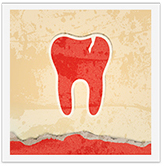
Refreshing Your Smile for Spring
Spring is on its way! For many of you, this is the time to thoroughly clean your homes of dust and cobwebs, get rid of clutter and let a breath of fresh air into your life. But what about your smile? Even with regular daily brushing and flossing, routine cleanings, or “prophylaxis” (literally “preventive treatment of disease”) at the dentist should be an important part of your spring routine. A twice-annual examination, check-up, and cleaning are highly recommended. In fact, according to the Academy of General Dentistry, getting a professional cleaning a least twice a year has a significant impact on the quality of a person’s long-term oral health. In the case of professional teeth cleaning, an ounce of prevention is worth a pound of cure. Read more

Cracked Teeth: Causes, Symptoms, and Treatment
With people living longer and more stressful lives, cracked teeth are seen more and more often at the dentist’s office. Yet cracked teeth can be difficult to detect for a number of reasons, most notably that the pain often comes and goes. Because of the short periods of erratic pain, it can be difficult to discern which tooth is the culprit. Read more

Kicking the Tobacco Habit is Good for Your Mouth
In the past 50 years the number of people in the United States who smoke cigarettes has dropped a dramatic 23 percent. However, the risks of tobacco use have not changed. Tobacco is not only dangerous to your heart and lungs, it can also affect your oral health.
From the mild side effects tobacco can cause, including bad breath, tooth discoloration, buildup of plaque and tartar, to the more sinister effects – including increased risk of oral cancer, loss of bone within the jaw, gum disease and any number of resulting complications — tobacco is an oral health risk. Read more

Dental Implants – Getting to the Root of Things
With regular dental care and some luck, you may never be a candidate for a dental implant, but knowing about them ahead of time will help inform your decision should the need ever arise. So, what are implants, how do they work, and who needs them?
Dental implants are artificial tooth “roots” that are placed into the jaw to help hold a replacement tooth, bridge, or even dentures, in place in the jaw. Read more